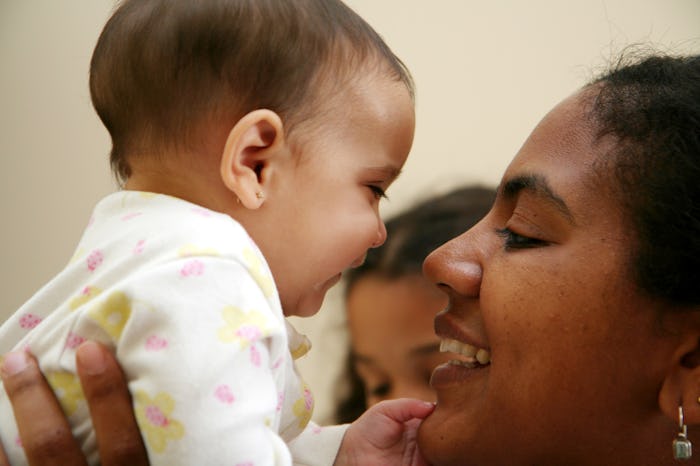Life

5 Things That Happen To Your Brain When You're A New Mom
Once baby arrives, some changes are more obvious than others. Now that you're responsible for a tiny human, you have less time to do all those things you took for granted. (Ahem — sleeping in and rolling into a late brunch on Sundays.) Lazy Sundays aside, there are also physical changes women experience post-childbirth, and one of the most subtle shifts are the things that happen to your brain when you become a new mom. Unlike the outward changes you may notice your body experiencing, differences in your brain may slip under the radar if you don't recognize some signs.
Most of the changes are normal, and with time will adjust back to your pre-baby condition. Common symptoms like forgetfulness are associated with the way the brain is different after giving birth and are considered non-threatening. However, more intense changes can lead to serious conditions such as postpartum depression and should not be taken lightly when experienced. The best way to stay on top of your post-birth health, is to understand what is happening to your brain once you become a mother. Then you will have a way to gauge your symptoms if you feel like things are off.
If you're experiencing any of the following changes, you may just have a case of "Mom Brain." But if you feel your symptoms are serious, you should always consult your doctor.
1Momnesia
Forgetting simple, everyday things make you feel like you're going crazy? Don't worry — you're not loosing your mind, you just have a case of Mommy Brain. “You’re gathering so much new information, so worried about simply keeping your baby alive and well-fed, that it consumes your brain," Shannon Seip, co-author of Momnesia, told Fit Pregnancy. The good news is that this won't last forever. The not-so-good news is that it could take up to one year for you to adapt to this new pattern. Hang in there mama, it will all come back to you!
2Cortisol Levels Change
A new baby brings new stressors, and as your stress peaks, so does your cortisol. Cortisol is a hormone released during child birth and when you are stressed, and according to Parenting, a stressed mom has cortisol effecting her brain almost constantly.
3Emotional Changes
The fluctuation of hormones throughout pregnancy and after birth can have serious effects. Mood swings and feelings of sadness may become a more regular occurrence when hormones are not balanced. According to Women's Mental Health website, research suggests these imbalances are the cause of postpartum depression.
4Nuerons Grow
If you are like me, you find yourself checking on your sleeping baby to make sure they're still breathing. It turns out, a group of neurons called amygdala are the cause. After giving birth, this group of neurons is known to grow and causes your brain to become hypersensitive to the needs of your baby, according to The Atlantic. On the bright side, these are the same neurons that make your body surge with joy when glimpsing your child.
5It Gets Bigger
If there's ever a time to brag about your big brain, it's after you've just given birth. As Live Science reported, a mother's brain grows after childbirth, and research suggests this is to help the mother gather and record the new skill set required for taking care of her child.